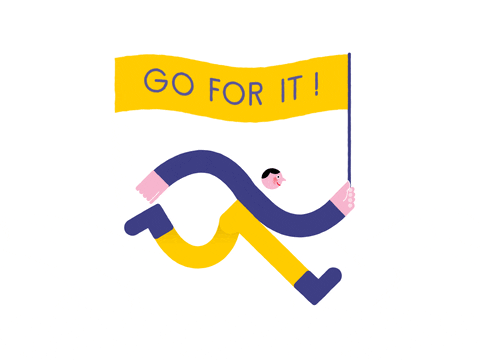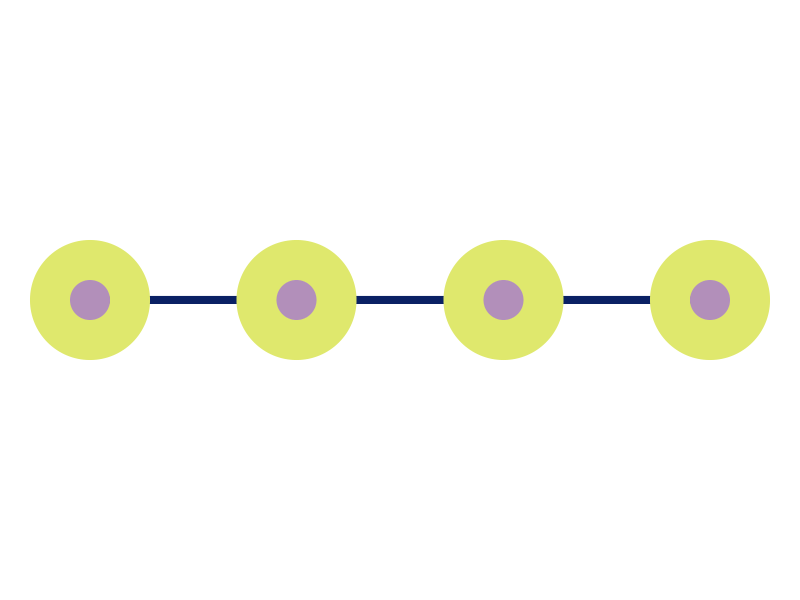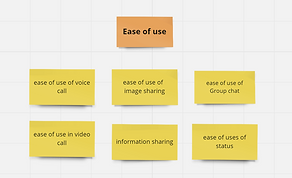Project Brief
Understand the pain points of users in India which can provide valuable insights into digital behavior, social impact, and business opportunities in this important market.
Duration: 12 weeks
Project Type: Team School Project, Qualitative Research
Team: Aditya and Trishala
Tools: Zoom (for interview), Miro, Taguette, Diary Study
My Role: UX Research, Interviews and Data Analyse


Understanding use of WhatsApp and their pain points for digital novice users in India
Background
WhatsApp is a popular messaging app with over 2 billion active users
worldwide (WhatsApp, 2021). In India,
However, not everyone is able to use WhatsApp effectively. Some
people, particularly those who are new to digital technology, may find
it difficult to use WhatsApp.


Motivation
-
India has seen a significant increase in digital adoption in recent years, but there are still many people who are not familiar with using digital tools.
-
WhatsApp has become an important tool for communication, information sharing, and community building in India.

My motivation is to understand the pain points of users in India which can provide valuable insights into digital behavior, social impact, and business opportunities in this important market.
Central Research Question


What are the factors that contribute to the effective use of WhatsApp by individuals with digital novices in India, and also identifying their pain points?
Detailed research questions-
-
How do digital novices in developing countries, particularly in India, use WhatsApp? What challenges and benefits do they experience with its use?
-
What are the specific challenges that these individuals face in accessing and using different features on Whatsapp?
-
What is the impact of WhatsApp on users life, particularly in terms of how they use this platform and which features they use the most to connect with friends and family, stay up-to-date with information, share knowledge, and exchange information related to work?
What is Digital Novice ?
A digital novice is someone who has limited or no experience with digital technologies.
-
They may be new to using computers, the internet, or mobile devices.
-
Difficulty using digital technologies because English is not their first language.

DATA GATHERING & ANALYSIS
Methods


Understanding the usage of Whatsapp
Further know the users habit while using Whatsapp
Semi Structured Interviews
Diary Study
-
All six participants were digital novices in India.
-
The interviews were conducted on Microsoft Teams.
-
The interviews lasted for 30-45 minutes each.
-
Open-ended questions were used to explore the participants' experiences with using WhatsApp, their preferred features, and their pain points.
-
A follow-up diary study was conducted for seven days.
-
Each participant kept a journal of their WhatsApp usage.
-
The study found that participants reported a number of challenges when using WhatsApp, including:
Participants

How did I Analyze?
Data Analysis Method- Bottom up approach
These codes are analysed using the bottom up method using the software Miro and card sorting method to arrive at final themes from the codes.


I used Taguette, a qualitative analysis software to code the interview transcripts and Survey results and came up with 43 codes.
Codebook Analysis


Card Sorting Method
We employed a collaborative approach to the analysis process by utilizing the data sharing capabilities of Taguette and Miro. This allowed us to work simultaneously on the data and arrive at a consensus on the themes that we used to analyze the data.


KEY FINDINGS
Key Findings - 1
Ease of Use of WhatsApp Builds Stronger Family Connections



-
Participants reported feeling more connected to their family members and having more frequent conversations due to the app's accessibility and convenience.
-
WhatsApp's group chat and image-sharing features provide a virtual space for family members to come together, share experiences, discuss important events, and offer emotional support.
Comments
If we want to do something on WhatsApp like to send a video or send a photo of someone's Aadhaar card and as if we want to send something to someone, we can send it to them through WhatsApp. We can do our work by getting help on WhatsApp.
I keep talking to my kids, some are in Florida, some are in Michigan, some are in Seattle, everyone is in one group, then we keep chatting. to build more trust
We have created a group to share what is happening in our family , we can easily communicate through whatsapp. I also use group calling and video calling alot.



Key Findings - 2
Difficulties in using WhatsApp impact family communication
Difficult to stay up-to-date on family news: Some users may find it difficult to stay up-to-date on family news, as they may not be able to see their family's status updates or photos.
Difficult to plan family events: Some users may find it difficult to plan family events, as they may not be able to easily communicate with their family members.

Comments
No I don't know about this status feature and neither do I use it.
I get a little confused about the group they are formed in. I still face difficulties while making a group on whatsapp.

Everyone sends photos very fast and I was unaware how to send them?


Key Findings - 3
WhatsApp can have a significant impact on the emotional aspect of a person's life. For example, it can help people to stay connected with friends and family, and it can provide a sense of support and belonging. However, WhatsApp can also be a source of stress and anxiety. For example, people may feel pressure to respond to messages immediately, or they may worry about being judged by what they post.

WhatsApp has both positive and negative effects on people's emotional well-being, as it can provide social support but also lead to stress and anxiety.
Comments
If any message comes, we will reply to it if we have time. If we do not have time, then we do it later. If the feeling comes from inside, we should reply to this message, we will reply if the feeling does not come from inside, there is no use in it.

I really don't like the feature, when I delete any message. The other person can see that I have deleted that message. it would be better if the other person don't know that a message got deleted. We delete the message because it is unnecessary, But it makes other
person curious that what message was deleted which causes miscommunication.


CONCLUSION
Discussion

-
WhatsApp can be a powerful tool for enhancing family communication and social support.
-
Importance of designing digital tools that are intuitive and user-friendly to promote adoption and use, particularly among older adults and user who may face technological barriers.
-
Designers should consider providing resources and support to help users navigate the emotional challenges associated with technology use, such as stress and anxiety.
-
Finally, designers should prioritize designing tools that promote positive emotional experiences, family communication, social support and connection, to enhance overall well-being and highlighting the importance of usability and user-centered design.
Implication

Limitation
-
Remote interviews & Participant: Interviews in the two different local language and then transcribed manually which might affect the data interpretation.
-
Small sample size and age group : Our study only included a small number of participants with diverse age group, which can limit the generalizability of the findings.
-
Variation in Technology Use Among Participants: Some participants only used WhatsApp on their phones, while others used Facebook, WhatsApp, and PhonePe. This variation in technology use could have affected the findings of the study.
-
Social desirability bias: Participants may be hesitant to report their struggles with digital technologies due to social desirability bias, which can affect the accuracy and completeness of the data collected.
Next Steps
-
In addition to semi-structured interviews and diary study, to increase the credibility and validity of findings by conducting focus groups with digital novices can provide a platform for participants to share their experiences and insights into the challenges they face when using whatsapp.
-
We would like to conduct more research on understanding ‘’How do digital novices identify fake news and scams?”
-
We would like to explore how WhatsApp can be used to enhance the education level and information access of digital novices.The most efficient ways to reach and help this people should be determined via studies on the potential of Whatsapp as a powerful tool for education and information.

DIARY STUDY QUESTIONS ASKED?
Asked total six questions for a week.
-
What are the applications did you used in today?
-
How many times did you use whatsapp?
-
Why did you use whatsapp for ?
-
What is the most used feature in a day like message, video call, voice call or add status on whatsapp?
-
Did you face any difficulties while using this app today?
-
Are there any feature you still think has to be improve?